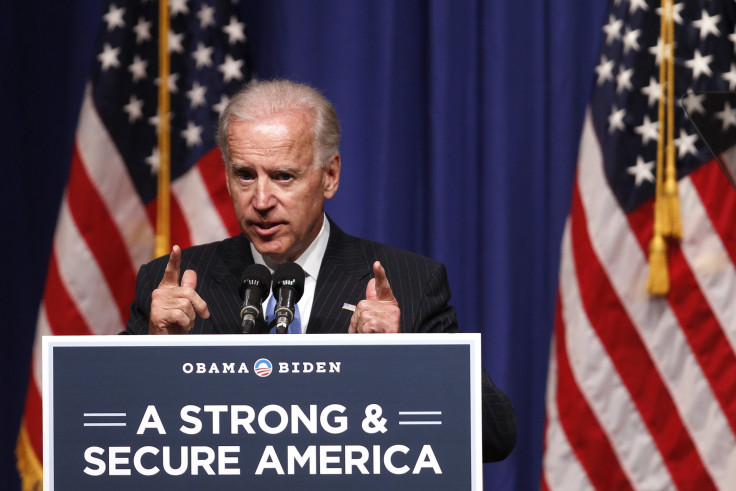Joe Biden In India: Will He Make Fun Of PM Manmohan Singh’s Accent?

U.S. Vice President Joseph Biden has arrived in India for a four-day visit to discuss economic, energy, defense and diplomatic ties between the world’s greatest superpower and its most populous democracy. Secretary of State John Kerry was in India late last month. This will be Biden’s first visit to India since he assumed the vice presidency in 2009 and comes ahead of a much anticipated trip to Washington in September by Indian Prime Minister Manmohan Singh. (Biden visited New Delhi in 2008 while he was senator from Delaware.)
Biden, accompanied by his wife, Jill, will meet with Singh as well as President Pranab Mukherjee. Prior to Biden’s arrival, the White House declared in a statement: "I think you can expect the vice president to set out an ambitious vision for the U.S.-India relationship, looking not just at the months ahead or the years ahead, but the decades ahead. And in particular, I think he will highlight all of the areas of potential -- the economic potential of our relationship.”
While the impetus for this trip involve some very weighty matters, Biden has a less than stellar reputation among Indians. At least twice in the past, he has openly insulted Indian people by mocking the way they speak. In July 2006, as speculation grew that Biden would mount a presidential bid in 2008, Biden remarked that "you cannot go to a 7-Eleven or a Dunkin' Donuts unless you have a slight Indian accent. I’m not joking," a reference to the large number of Indian immigrants who work in convenience stores in the U.S. He prefaced that comment, by noting that he had a “great relationship” with Indian-Americans and that in his home state of Delaware, “the largest growth in population [comprises] Indian-Americans moving from India.”
The comment sparked some outrage and ridicule although it appeared to be divided by party loyalties. Soon afterward, Dr. Raghavendra Vijayanagar, chairman of the Indian-Americans Republican Council (IARC), told the Press Trust of India that Biden had a history of making such insensitive and inappropriate remarks. "But even for him, this recent gaffe is clearly over-the-top,” he said. “But this isn't the first time a Senate Democrat has insulted Indian-Americans,” citing the time in 2004 when then-Sen. John Kerry referred to Sikhs as “terrorists” and then-Sen. Hillary Clinton referred to Mahatma Gandhi as a “gas station owner.”
“A clear double standard in the mainstream media will likely ensure Sen. Biden gets a pass over these comments that would get a Republican in deep trouble if he ever made a similar statement," the chairman noted. "It's amazing to know we don't all work at Dunkin' Donuts or the local 7-Eleven. The contributions to America by Indian-Americans in the fields of medicine, education, science and business have been well documented.”
Similarly, an Indian-American Republican candidate for Congress from Philadelphia named Raj Peter Bhakta condemned Biden's remarks as "callous and racist." "These are ridiculous, callous and insensitive comments, which would simply be laughable if they weren't coming from a Democratic presidential candidate," Bhakta said. "You'd never know from listening to Biden that Indian- Americans have contributed to this country other than making a mean cup of coffee."
Hoping to limit damage from the comments, Biden’s spokeswoman Margaret Aitken, released the following statement: "The point Sen. Biden was making is that there has been a vibrant Indian-American community in Delaware for decades. It has primarily been made up of engineers, scientists and physicians, but more recently, middle-class families are moving into Delaware and purchasing family-run small businesses." She added: “These families have greatly contributed to the vibrancy of the Indian-American community in Delaware and are making a significant contribution to the national economy as well.”
Interesting, after the “Dunkin' Donuts” gaffe, some Indian-Americans sprang to Biden’s defense. Supriya Christopher, executive director for the bipartisan U.S.-India Political Action Committee (USINPAC), said in a statement she did not consider Biden’s comments derogatory or racially charged. Also, Mini Timmaraju, a former board member of Indian-American Leadership Initiative, wrote: "While I was concerned that Sen. Biden's comments were stereotypical and could have the unintended consequence of offending elements of the Indian-American community, I did not personally find them offensive. I did find them remarkable.”
However, six years later, as vice president, Biden struck again. In January 2012, during a speech in New Hampshire on the outsourcing of call centers (many of which moved to lower-cost India), Biden appeared to imitate a stereotypical Indian accent by asking: "How many times do you get the call, 'I'd like to talk to you about your credit card'?.” Again, U.S. media had a field day with the latest gaffe, although some outlets couldn’t agree if Biden was using a fake Indian or Russian accent.
© Copyright IBTimes 2025. All rights reserved.





















